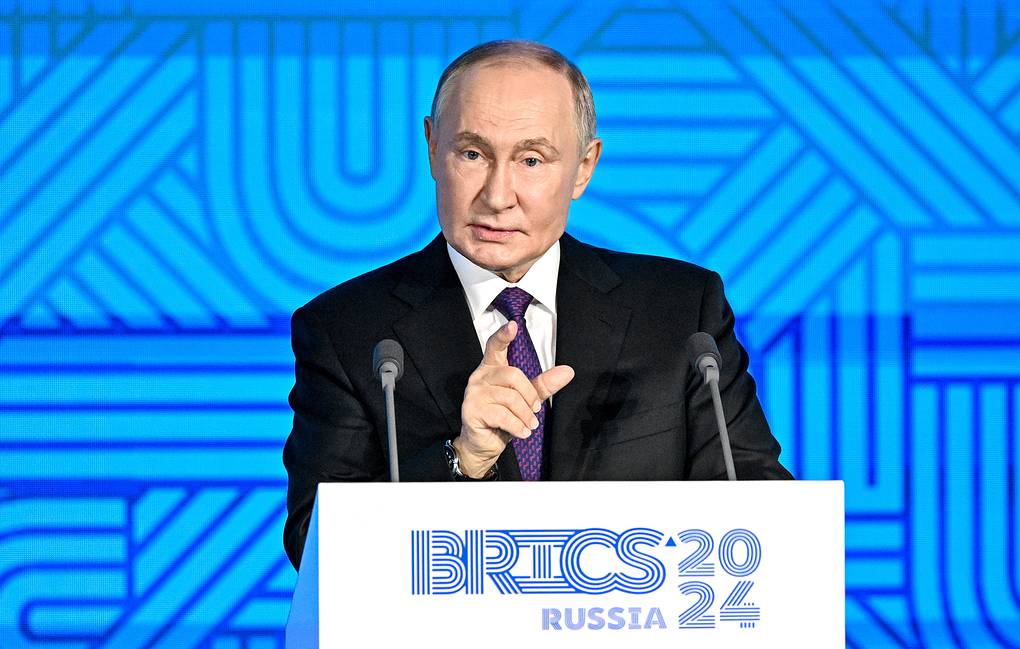
Russian President Vladimir Putin is set to host the 16th annual BRICS summit, aiming to reaffirm Moscow’s role on the global stage and present the BRICS coalition as a counterweight to Western dominance in international politics and trade. The summit will take place in Kazan, Russia, on Tuesday, with notable leaders such as Xi Jinping of China, Narendra Modi of India, Recep Tayyip Erdogan of Turkey, and Masoud Pezeshkian of Iran expected to attend.
This summit comes amidst ongoing conflict in Ukraine and an international arrest warrant for Putin, challenging the notion that these issues would isolate him on the world stage. Russian officials view this gathering as a significant diplomatic achievement, with Yuri Ushakov, an aide to Putin on foreign policy, announcing that 32 countries have confirmed their participation, over 20 of which will send their leaders. Ushakov highlighted that Putin is expected to hold around 20 bilateral meetings, suggesting that this summit could become “the largest foreign policy event ever hosted” in Russia.
The significance of the BRICS alliance extends beyond mere attendance. Raymond Matlala, Chairman of the South African BRICS Youth Association, remarked, “BRICS is the voice of the Global South in multilateral platforms dominated by the West. It’s the only formation that can help rescue the Global South from the current global order.” This sentiment underscores BRICS’s role in amplifying the voices of developing nations amid the prevailing Western influence.
Analysts, including Alexander Gabuyev of the Carnegie Russia Eurasia Center, suggest that Russia’s goal is to create a platform for trade among its partners that circumvents sanctions. He explained that by fostering an alliance with China, India, Brazil, Saudi Arabia, and other vital partners, Russia aims to establish a trade network that the U.S. would be reluctant to target with sanctions. This strategy provides Russia with “breathing space” in the face of ongoing Western pressures.
For Putin, the summit represents a personal victory, signaling the failure of Western attempts to isolate him. Gabuyev points out that the Kremlin seeks to project unity among its international allies while navigating heightened tensions with the West. Furthermore, the summit offers an opportunity for participating countries to strengthen their influence and promote their respective narratives.
The BRICS alliance has seen remarkable growth in recent years, expanding to include new members such as Iran, Egypt, Ethiopia, the UAE, and Saudi Arabia. This year’s summit is poised to facilitate further expansion, with Putin extending invitations to more than two dozen countries, including Azerbaijan, Belarus, Turkey, and Mongolia, that are either interested in joining or have already applied.
Originally established in 2006 with Brazil, Russia, India, and China, the group became BRICS in 2010 with the addition of South Africa. The coalition was formed to unite significant developing nations as a counterbalance to the political and economic influence of wealthier countries, particularly those in North America and Western Europe.
From the outset, BRICS members have argued that Western nations dominate key global institutions such as the International Monetary Fund (IMF) and the World Bank. These institutions, which provide financial assistance to governments, often reflect Western interests, underscoring the necessity for a coalition that amplifies the voices of emerging economies.
In 2014, BRICS launched a New Development Bank aimed at financing infrastructure projects in member countries. More recently, Egypt, Ethiopia, Iran, Saudi Arabia, and the UAE were invited to join, although a Saudi official later clarified that Riyadh had not formally joined the group. Argentina also received an invitation, but President Javier Milei withdrew shortly after taking office in December 2023.
Despite these challenges, the expanded BRICS coalition now represents around 3.5 billion people—approximately 45 percent of the global population. Their combined economies exceed $28.5 trillion, accounting for about 28 percent of the world economy. Should Saudi Arabia formally join, BRICS members would collectively produce approximately 44 percent of the world’s crude oil.
As the summit approaches, the focus will be on how BRICS can navigate the complex geopolitical landscape and whether it can solidify its role as a significant player in international relations. The gathering presents an opportunity for member states to enhance their global influence while pushing back against Western hegemony.








